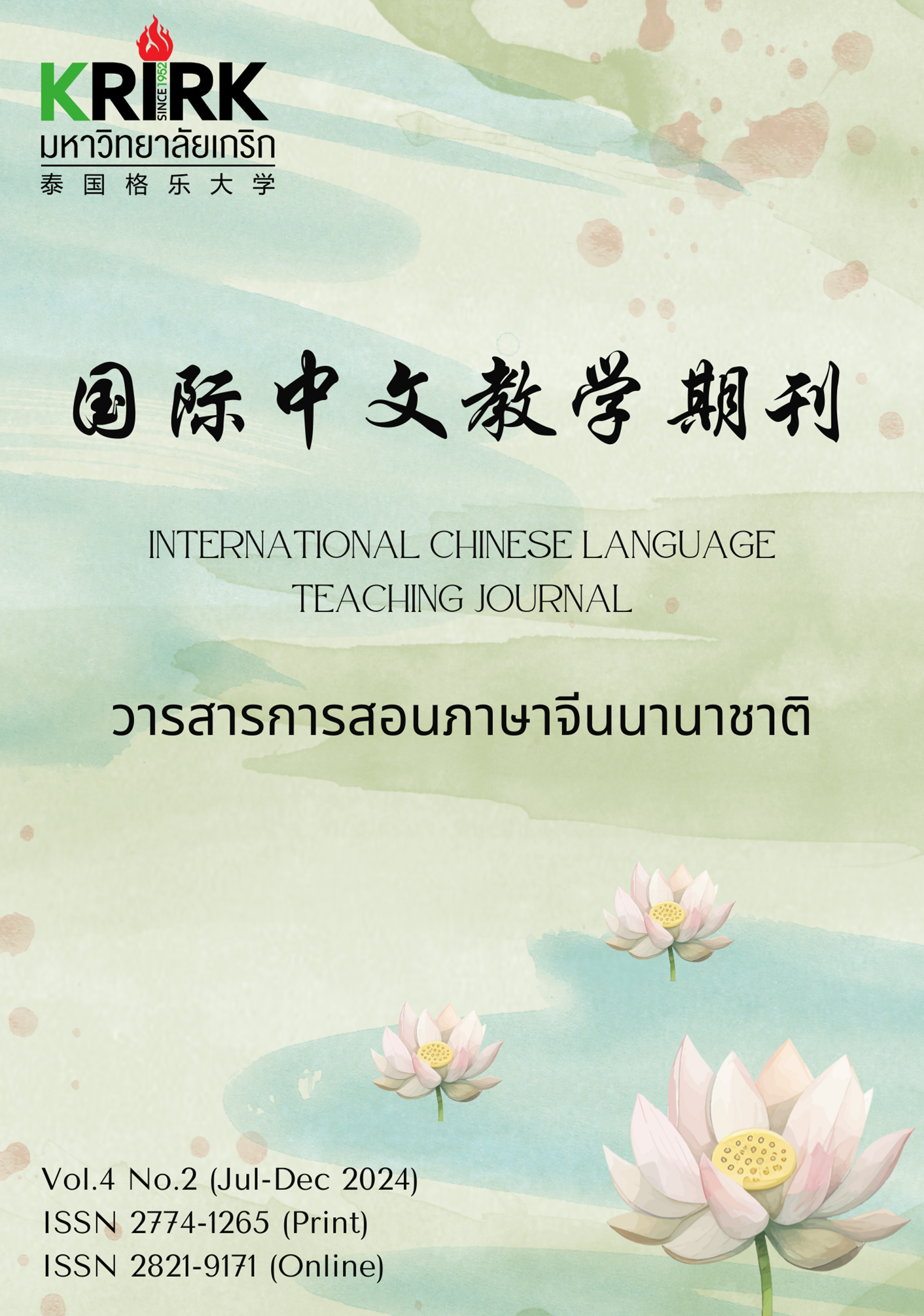近五年(2019-2024)人工智能背景下国际中文教育研究动态与发展趋势
关键词:
人工智能 , 国际中文教育 , 范围研究摘要
近些年来,国际中文教育的数字化转型和智慧化发展迅速,鉴于人工智能对于推进国际中文教育智能化发展的重大作用,为掌握其研究动态和发展趋势,有必要对该领域的研究情况进行梳理。本文通过对中国知网(CNKI)数据库,收集了近五年间(2019—2024)人工智能背景下国际中文教育研究的 59篇相关文献,基于范围综述方法,并使用CiteSpace可视化软件,分析其发展现状和发展趋势,研究发现:1)人工智能背景下国际中文教育发展总体情况波动较大,大致上分为起步和快速发展两个阶段;2)研究热点包括五个方面:人工智能在汉语作为第二语言教学的应用与实践、人工智能背景下国际中文教育面临的机遇和挑战、国际中文教育数字化转型和智慧化发展、人工智能背景下国际中文教育政策和发展战略、人工智能背景下教师身份转变和素养提升;3)人工智能背景下国际中文教育体现出多元化、广泛性、动态性的研究趋势。对人工智能背景下国际中文教育研究现状及其发展趋势进行分析,可以为未来的研究提供意见参考。
参考
Chen, Y, Chen, Ch, Liu, Z, Hu, Zh, & Wang, X. (2015). Methodological function of CiteSpace knowledge graph. Scientific Research, (2): 242-253.
Cui X. (2024). Artificial intelligence: opportunities and challenges for language teaching. Chinese Language Teaching and Research (2), 20-29.
Deng, Q. (2024). ChatGPT-like generative artificial intelligence empowers Chinese second language teaching: opportunities and challenges. China Education Informatization (3), 121-128.
Fan H., Wang L., Cao F., Zhao R. (2024). Research on enhancing the digital literacy of international Chinese teachers by generative artificial intelligence: evaluation framework, current situation, and suggestions. Journal of Tianjin Normal University (Social Science Edition) (3), 72-83.
Gu L. (2023). The impact of ChatGPT on the training of international Chinese teachers and its response. Journal of Yunnan Normal University (Teaching and Research on Chinese as a Foreign Language) (3), 63-70.
Jiang L., Wang L. (2021). Construction of Chinese learning platforms under the perspective of smart education: characteristics, functions, and implementation paths. International Chinese Education (Chinese and English) (4), 91-99.
Jin X. The expected functions, practical difficulties, and application strategies of ChatGPT in the deep integration of international Chinese education. Journal of Yunnan Normal University (Philosophy and Social Sciences Edition) (04), 52-58.
Language Service and Cultural Heritage Research Center of Guangdong-Hong Kong-Macao Greater Bay Area, Guangzhou University, 2020, “China Language Service Development Report (2020)”
Le S., Cao M. (2023). The contemporary value and practical approach of digital empowerment of international Chinese education. Ethnic Education Research (6), 149-156.
Li B, Ma R, Xu J, Hao Y, et al. (2023). “ChatGPT is coming: new opportunities and challenges for international Chinese education” Discussion (Part 2). Language Teaching and Research (04), 1-12.
Li B., Zhuang Y. (2020). Characteristics, challenges, and countermeasures of incorporating Chinese into the national education systems of countries along the Belt and Road. Language and Writing Application (2), 89-98.
Li Y, Li B, et al. (2020). “Chinese international education under the COVID-19 pandemic: challenges and countermeasures” (Part 1). Language Teaching and Research (4), 1-11.
Lin A, Wang Y. (2024). Reflection on the theory of artificial intelligence singularity based on ChatGPT: ontological presupposition, analogical logic, and subject concern. Academic Exploration (3), 67-73.
Liu Z. (2024). Digital humanities integrated into international Chinese education under the construction of new liberal arts: internal logic and application path. Heilongjiang Higher Education Research (10), 77-83.
Luo X, Xu J. Mediated governance of risk society: an integrated analytical framework. Journal of Guangzhou University (Social Science Edition) 1-12.
Ministry of Education. (2019). Statistics of the number of international students studying in China in 2018 by the Ministry of Education of the People’s Republic of China [EB/OL]. (2019-04-12).
Ministry of Education. (2020). “China Language Service Development Report (2020)”[EB/OL].(2020-06-02).
Ou Z., Liu Y., Hao J., Yu F. (2024). Interpretation of generative artificial intelligence policy from an international perspective: construction of an action plan for the intelligent development of international Chinese education. Journal of Qinghai Nationalities University (Social Science Edition) (3), 181-189.
Wang Y, Huang Y, and An H. (2023). How does artificial intelligence affect teachers' professional development? ——Nvivo analysis based on Chinese core literature. Future and Development (6), 77-82.
Wang Y, Wang D, Liang W, Liu C. (2023). "Aladdin's Lamp" or "Pandora's Box": The potential and risks of ChatGPT educational applications. Modern Distance Education Research (2), 48-56.
Xu J., Ma R. (2023). Technological transformation of international Chinese education under the wave of ChatGPT. International Chinese Teaching Research (2), 41-5.
Yan H, Liu H. (2024). Analysis of the development status and theme evolution of international Chinese education digitalization research. International Chinese Teaching Research (2), 41-51.
Yuan X, Wu Y. (2023). Opportunities, risks, and coping strategies brought by ChatGPT Plus to international Chinese education. Journal of Yunnan Normal University (Teaching and Research on Chinese as a Foreign Language) (3), 53-62.
Zhao Y, Dong B. (2022). Bibliometric visualization analysis of ideological and political research in foreign language courses (2015-2021). Foreign Languages, (6), 129-139.
Zheng Y, Xu L. (2023). On the reconstruction of the knowledge system of international Chinese teachers in the digital transformation period. Journal of Yunnan Normal University (Teaching and Research on Chinese as a Foreign Language) (3), 22-30.
Zhu Z., Jin Z., Dai L., Jiang H. (2024). Digital intelligence empowers the new quality development of higher education: new roles for teachers in the era of GAI technology. Research on Audio-visual Education (6), 5-13.
##submission.downloads##
已出版
##submission.howToCite##
期
栏目
##submission.license##
##submission.copyrightStatement##
##submission.license.cc.by-nc-nd4.footer##





